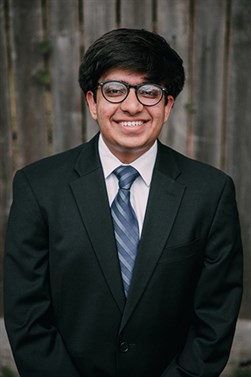 Dhananjay Khanna, a senior in the Department of Computer Science and Engineering at Texas A&M University, has been named chief justice of the Texas A&M Student Government Association (SGA) Judicial Court. Similar to the Supreme Court of the United States, the SGA is appointed one chief justice and eight associate justices.
Dhananjay Khanna, a senior in the Department of Computer Science and Engineering at Texas A&M University, has been named chief justice of the Texas A&M Student Government Association (SGA) Judicial Court. Similar to the Supreme Court of the United States, the SGA is appointed one chief justice and eight associate justices.
In this role, Khanna will serve as the head of the judicial branch of the SGA. His responsibilities will include scheduling and presiding over all hearings, issuing the opinions of the court and making sure that all of the associate justices and judicial advocate generals who serve alongside him are well-versed in the governing documents and can apply them impartially to any case.
Khanna has served as associate justice in the organization for two years, which allowed him to become eligible for this esteemed position. He is a member of the departmental honors program and has served as a peer teacher, where he works alongside other students and helps them succeed in computer science courses.
“My main goal is the development of the associate justices and judicial advocate generals who serve with me,” Khanna said. “I really enjoy any opportunity that allows me to mentor individuals to meet their potential, and with a group as select as these eight justices, I get to do so with some of the most talented and driven people on this campus.”
The process for confirmation of this position is also very similar to the U.S. Supreme Court. The student body president nominates an individual for associate or chief justice. To be confirmed, the nominee needs a two-thirds majority vote from the Student Senate.
“I feel very blessed that Texas A&M made my dreams of coming to the United States possible through scholarships and financial aid,” said Khanna, who is originally from India. “Getting this position allows me to continue serving the students while tasking me with greater powers that I hope to use to ensure the integrity of the SGA.”
The mission of the SGA is to serve Texas A&M by representing student opinion, addressing campus needs through targeted programming and the maintenance of tradition, and providing opportunities for leadership development in order to enrich the quality of student life.